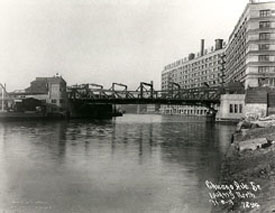Montgomery Ward
Montgomery Ward, better known as Wards, was founded by Aaron Montgomery Ward in 1872 as the world's first mail-order business. At one point, Montgomery Ward was considered one of America 's largest retailers. However, declining sales during the twentieth century took the company out of business in 2000. (41)
Origin
While working as a traveling salesman for various dry-goods retailers, Aaron Montgomery Ward came in contact with members of rural American communities, who desired strongly the comforts of city life. Those occupying rural areas fell victim to inflated costs by intermediaries and uncertainties in the levels of product quality. By eliminating these intermediaries, Ward believed he could provide goods for rural community members at a lower cost. They would simply purchase goods by mail and have them delivered to their nearest train station. (42)
Several mishaps lead Ward to a rough beginning, including the destruction of his inventory by the Great Chicago Fire of 1871. However, Ward finally established his business at his offices on the corner of North Clark and Kinzie streets with two partners and $1,600 in start-up capital. Ward issued the first catalogue in 1872, which consisted of one single-sheet price list which Ward composed himself. The following year, Ward was abandoned by his two partners, but continued on with the help of his future brother-in-law, Richard Thorne. (43)
Throughout the next several decades, Ward experienced rapid growth. Although some of his rural customers felt he was encroaching, most were attracted to the wide range of items they otherwise could not purchase locally. In addition, customers placed a great deal of trust in Ward's policy of “satisfaction guaranteed or your money back,” which he began using in 1875. Ward's love for the rural American placed him in a positive light to less-wealthy Chicagoans. (44)
Catalogue
Ward's catalogue was known to many as the “Wish Book.” It experienced rapid growth, and in 1883 had grown to 240 pages and 10,000 items. In 1896, Ward experienced his first competition in the mail-order market, when Richard W. Sears and Alvah C. Roebuck issued their first catalogue. During the late nineteenth and twentieth centuries, both firms competed heavily for the dominant share of the market. (45)
“By 1904, the company had grown such that three million catalogs weighing 4 pounds were mailed to customers. In 1908 the company opened a 1.25 million sq ft catalog warehouse along the north side of the Chicago River in downtown Chicago. The building, known as the Montgomery Ward & Co. Catalog House, served as the company headquarters until 1974. It was declared a National Historic Landmark in 1978 and a Chicago historic landmark in May 2000.” (46) |
 
Ward's Catalogues |

Montgomery Ward & Co. Cataloge House |
The Montgomery Ward catalog's place in history was assured when the Grolier Club, a society of bibliophiles in New York, exhibited it in 1946 alongside Webster's dictionary as one of one hundred American books chosen for their influence on life and culture of the people. (47)
In 1926, the company broke the mail-order tradition by establishing its first retail location in Plymouth, Indiana. Although it continued its mail-order aspect, the company focused heavily on expanding to retail outlets during the 1920s. Recognizing Ward's potential ability in the retail market, Sears offered a merger in 1930, which the company turned down. After World War II, Montgomery Ward had become the third-largest department store chain. (48) |
Collapse
Throughout the mid-to-late twentieth century, Montgomery Ward, like many other department stores, began losing their customer base as a result of price competition with the likes of K-Mart, Target, and Wal-Mart.
On December 28, 2000, the company announced it was going out of business and would close its remaining 250 retail outlets and lay off its 37,000 employees. All the stores closed within weeks of the announcement. (49)
Return
Late in 2004, the Montgomery Ward name returned to retail but only in the form of an Internet retailer. (50)
Aaron Montgomery Ward
Chicago Department Stores & Retail Entrepreneurs


